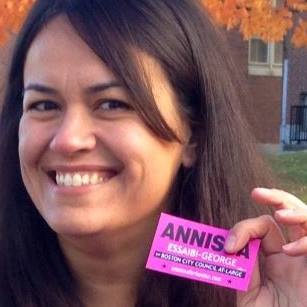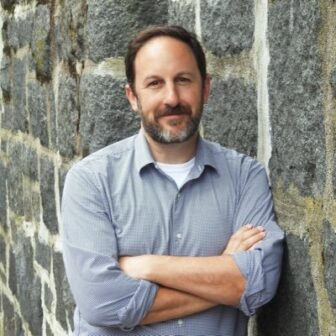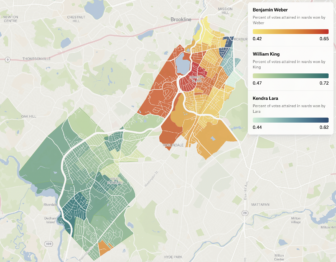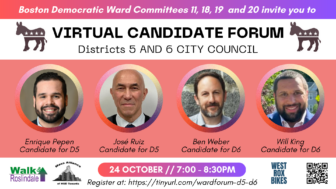Annissa Essaibi-George is the only challenger to the four incumbent At-Large Boston City Councilors for the Tuesday, November 3rd municipal election. She spoke with Jamaica Plain News about her candidacy.
Q: Why are you running for the at-large city council?
A: I’m running for a few reasons. Most important to me is to be able to use my experiences as teacher, business owner and parent to add value to the city council. Especially in areas such as education – it is our largest budget item we vote on. From my 13 years in the classroom I have a special experience to share with that process… I teach at East Boston High School, 11th and 12th grade social studies, which means I teach electives.
Q: What do you think your chances are of unseating one of the incumbents?
A: I think they’re good. I think that part of deciding to get into race is to decide your odds and ability to get elected. I think it’s good to have races and have challengers involved in the process. But you have to consider whether you’ll be successful. It takes a tremendous amount of effort, time and money and ultimately the test will be Election Day.
Q: You ran once before and finished fifth. What did you learn from your previous campaign?
A: To start earlier, which I did. To hit more doors. Meet more voters. I also learned that my message resonated with voters, who are tuned into what I talk about and continue to talk about: schools, economic development and public safety — plus 100 more things. Those are the ones I spend most of my time talking about.
The schools piece is the high schools piece. People like to feel connected to what I talk about because I know what I’m talking about because I’m a classroom teacher.
Economic development: Especially as it relates to small business growth in our neighborhoods. I’m in Dudley Square for a forum right now and there are empty storefronts. We need to make sure that business can happen in our neighborhoods and our city is supporting business. That is the backbone of Boston neighborhoods — the small businesses.
Q: If elected what would be the first issue you would take up?
A: I think that as a city councilor it’s not just to focus on one issue. You have to deal with multiple issues. I would definitely focus on education and supporting the work that BPS (Boston Public Schools) does, but also working to improve that [work]. I will spend time on the mayor’s high school redesign plan and efforts to rebuild and to fix what’s not working and strengthen what is working.
I’m the former director of Fields Corner Main Streets and was while I was getting my master’s in education. My resume is weird and patch-worked.
I’m also a small business owner, so I know it’s important to focus on supporting our small business owners and their growth and having opportunities to do business in Downtown Crossing or the Seaport, the areas where the city has been focusing on. I’d like to develop a commercial business affordable plan similar to our housing affordable plan, so we can we provide similar services to commercial spaces in newer areas being redeveloped.
Q: How do you feel about expansion of charter schools?
A: I support the cap on charter schools. I think it’s important that as a Boston city councilor I’m supporting the work at BPS. As a city we don’t have authority or a responsibility to charter schools. There is no relationship to BPS, the school committee, and school council to charter schools. We do not have authority over curriculum and teachers and there’s a huge disconnect. To take an active role in expanding them is not where I should be focusing my attention. I would look to focus city resources on strengthening BPS. That doesn’t mean I don’t support and represent families and kids in charter schools.
Q: While on the campaign trail what are people saying they are most concerned with?
A: Economic stability and job stability is a big focus in major parts of the city. I was at Rosie’s Place and met with women who get services there… Jobs in general (are a big issue). But also housing, and creating more family shelters and creating traditional housing in Boston for women and women with children. And creating housing in general. On the housing front, as a city we are booming especially on higher-end like condos and apartments. But we need to remember that we need to work and support those who are most vulnerable. We have a substantial homeless population and there is a lack of traditional services — a lack of housing, and a lack of family shelters in the City of Boston. It connects back to my time as a classroom teacher. I’ve had students who are homeless because there is an age restriction on boys and at a certain age you must be separated from their mom in a shelter. We need to make sure we keep families intact and transitioning them to stability.
Q: What about in JP?
A: Housing for sure. The housing prices continue to rise. There’s a demand on housing in JP. The average market (for a for sale property) in JP is for about eight or nine days. On average it’s 44 days in Boston. It indicates the demand on housing in JP (which is good that people want to live in JP). It drives the cost up. We have to look for more ways to create housing that fits into the character of neighborhoods. You have a great school in the Curley and community around school — how do we replicate that at other schools in JP?
Q: And you ran a neighborhood association? How does that help with your vision of the city?
A: I ran Fields Corner Main Street program, and I’m the former president of the Columbia Savin Hill Civic Association. I’m a member of the Dorchester House Health Center and on the board of directors. I think that one of the things I bring to the table is my experience, and having different long-time experiences in the city brings a lot of knowledge and experience. It’s important to having community health centers across the city that are financially strong and provide services. I look forward to supporting their efforts. When I consider my civic work — that’s my heritage and roots, coming from that community perspective. When neighborhoods constantly feel they are working against the city, the BRA (Boston Redevelopment Authority) and zoning… being able to recognize that experience as a civic association president, you want your voice and the community voice appreciated. Sometimes that voice gets lost in the shuffle. I’d like to be an ally to community groups who feel left out of process or shut out and ignored.
Q: How would you vote on the issue of city councilors pay raises?
A: I would vote against it. I think that it should be a public vote. I think they should vote publicly.










